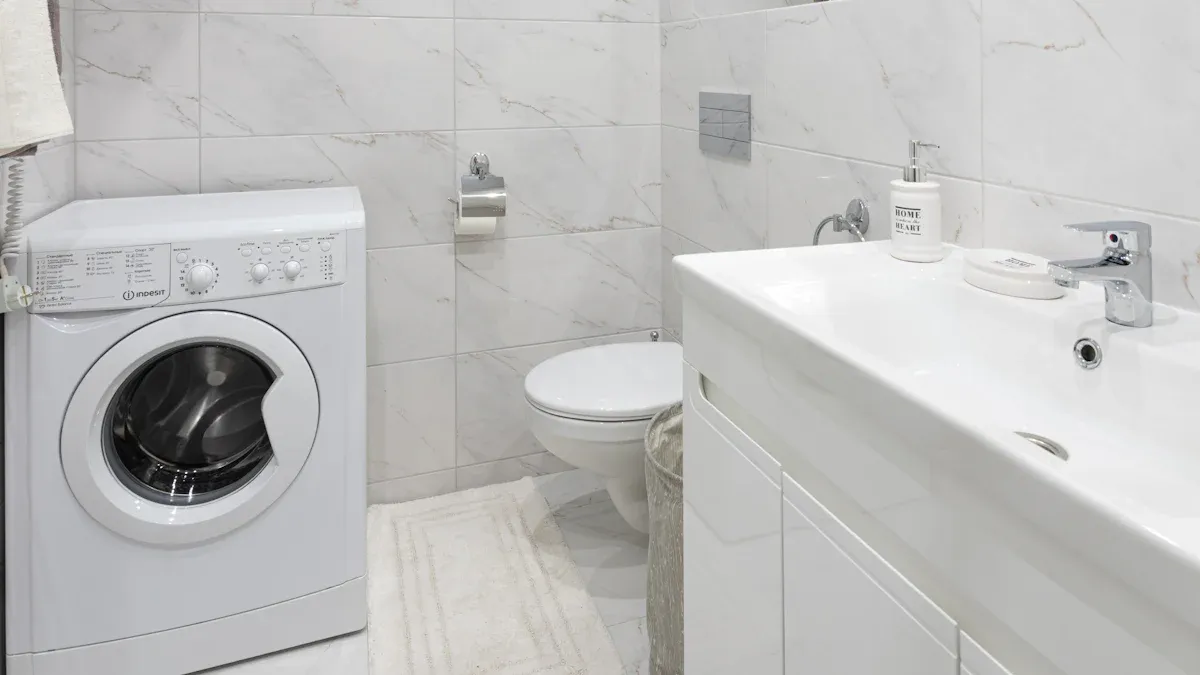
安定した性能、長寿命、省エネルギーを実現する給湯器加熱エレメントが必要です。2025年には、Rheem、AO Smith、Bradford Whiteといった給湯器のトップブランドが、信頼性の高い給湯器と高品質な製品の基準を打ち立てます。世界の給湯器市場は活況を呈しており、その予測値は以下の通りである。 428.8億米ドル、年平均成長率(CAGR)12.4% 2032年まで。スマート・コントロール、ハイブリッド・システム、アンチスケール機能は、現在、主要な給湯器加熱エレメント・オプションを定義している。エネルギー効率に優れ、アプリに接続されたシステムを求める消費者の需要は、引き続き技術革新の原動力となっている。
| メートル/アスペクト | 詳細/価値 |
|---|---|
| 2025年の市場規模 | 428億8000万米ドル |
| CAGR(2025~2032年) | 12.4% |
| トップブランド | A.O. Smith、Rheem、Bradford White、Ariston、Haier |
| 主なイノベーション | ハイブリッドヒートポンプ、Wi-Fi制御、アンチスケール技術 |
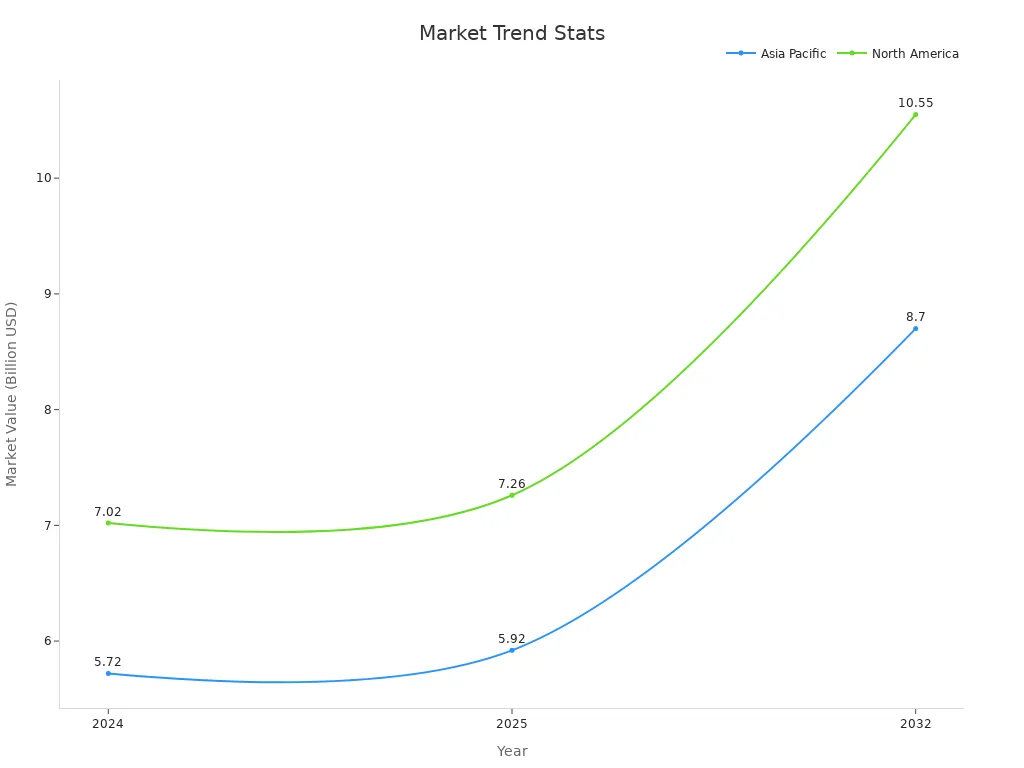
給湯器ヒーターエレメント早見表
給湯器の発熱体を評価する際には、給湯器のトップブランドがどのように積み重なるのかを明確に把握したいものです。この比較は、性能、耐久性、効率、互換性、価格など、最も重要な機能に焦点を当てるのに役立ちます。以下では、主要なモデルとブランドを並べて見て、技術的な違いや評価を簡単に解釈できるようにしています。
トップ給湯器ブランドの側面比較
| ブランド/モデル | 設置タイプ | 流量 (GPM) | エネルギー効率 | 特徴 | 耐久性 | 保証(熱交換器/部品/工賃) | 平均コスト | バリュー・フォー・マネー |
|---|---|---|---|---|---|---|---|---|
| リンナイ V53DeP | アウトドア | 5.3 | 高い | スケール検知システム、温暖地向き | グッド | 10年/5年/1年 | 中程度 | グッド |
| リーム ECO160DVLP3-1 | 屋内 | 7.0 | 高い | デジタルサーモスタット、リモコン | 素晴らしい | 12/5/1年 | 中程度 | 素晴らしい |
| ナビエン | 屋内/屋外 | 6.6 | 素晴らしい | 簡単なインストール、高度なコントロール | グッド | 15/5/1年 | やや高い | 優れた長期的価値 |
| ノーリツ | 屋内/屋外 | 6.5 | グッド | 信頼性が高く、手頃な価格 | 素晴らしい | 12/5/1年 | より手頃な価格 | 優れた即戦力 |
パフォーマンス
ピーク時でも安定したお湯を供給する給湯器が必要です。RheemとNavienのモデルは、大流量と高度なデジタル制御で際立っています。これらの機能は、信頼性の高い性能と高い給湯器の評価を得ることを保証します。リンナイは、特に温暖な気候で確かな性能を提供し、ノーリツは日常使用での信頼性に重点を置いています。
耐久性
耐久性はあなたの決断に重要な役割を果たします。ナビエンは 熱交換器15年保証これは、製品に対する長期的な信頼の証です。ノーリツはまた、12年保証と堅牢な構造で優れた耐久性を提供します。Rheemの発熱体は高品質の素材を使用しており、給湯器の寿命を延ばすのに役立ちます。リンナイは、特に屋外設置で優れた耐久性を発揮します。
効率性
2025年もエネルギー効率はお客様の最優先事項です。ナビエンは優れた効率性でリードしており、エネルギー消費量の削減と光熱費の削減に貢献します。RheemとRinnaiはどちらも高効率で、デジタルサーモスタットやスケール検知システムなどの機能に支えられています。ノーリツは効率が良いので、性能とコストのバランスを取りたい人には堅実な選択となる。
ヒントエネルギー効率の高い給湯器を選ぶと、長期的な運転コストを大幅に削減できます。
互換性
特定の給湯器モデルと設置タイプに適合する加熱エレメントが必要です。RheemとNavienは、屋内と屋外の両方のセットアップのための汎用性の高いオプションを提供しています。リンナイは屋外モデルに特化し、ノーリツは様々な設置ニーズに対応する柔軟なソリューションを提供しています。購入前に必ず既存の給湯器との互換性を確認してください。
価格
価格は最終的な決断を左右することが多い。ノーリツは手頃な価格で際立っており、すぐに価値を見出したい場合に最適です。Navienは、初期費用はやや高いが、効率性と耐久性により長期的な節約に優れている。RheemとRinnaiは適度な価格設定で、機能と価値のバランスを取っています。
注:高品質の給湯器用ヒーターエレメントに投資することで、システムの性能を向上させ、寿命を延ばすことができます。
2025年の給湯器発熱体の種類
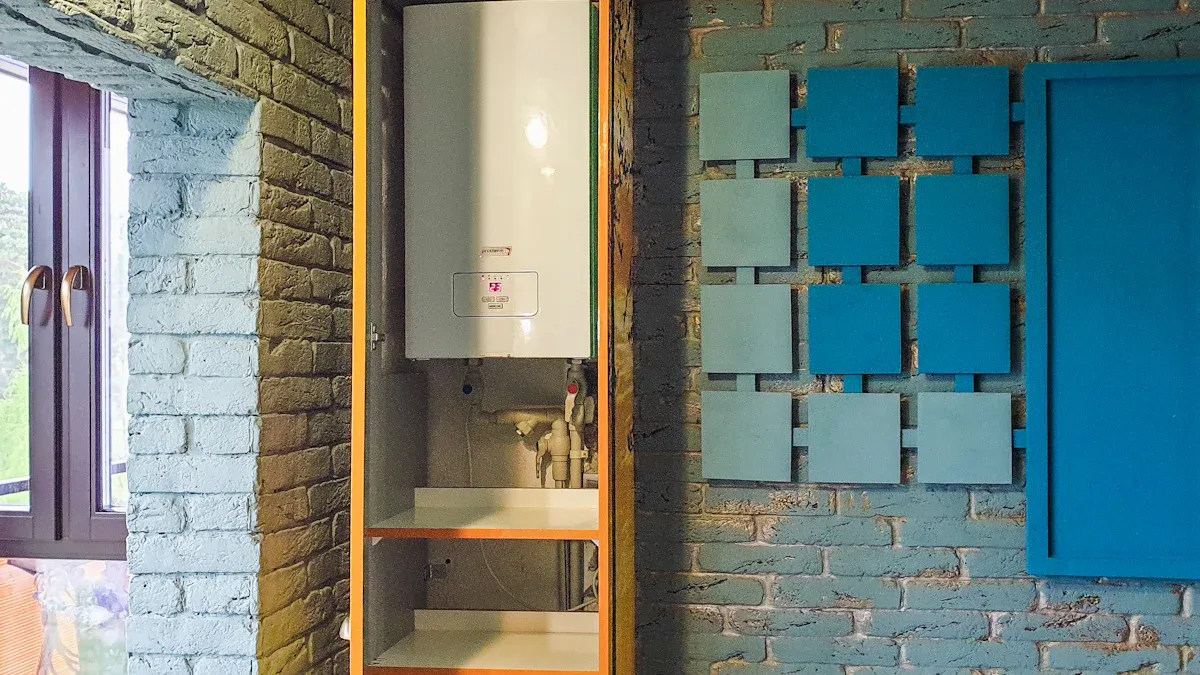
タンク式給湯器やその他のシステムに適した給湯器用発熱体を選ぶには、最新のタイプや技術を理解する必要があります。2025年には、効率と信頼性を高めるために、先進的な素材やスマートな機能を使用したさまざまな給湯器が見つかるだろう。市場調査によると、電気ヒーター・エレメントは現在 製品タイプ別、用途別家庭用給湯器は、エネルギー効率の高いソリューションの需要をリードしています。このことは、従来の電気温水器と最新のスマート・システムの両方で利用可能な幅広いオプションに反映されていることがわかります。
浸漬型ヒーター発熱体
浸漬型エレメントは、タンク式給湯器の最も一般的な選択肢です。これらのエレメントは水を直接加熱し、様々な給湯器において信頼性の高い性能を発揮します。
銅エレメント
銅エレメントは熱伝導性に優れ、加熱速度が速い。エントリー・レベルのタンク式給湯器でよく見られます。銅は軟水では腐食しにくいですが、硬水環境では劣化が早くなることがあります。多くの住宅所有者は、その手頃な価格と迅速な加熱時間のために銅を選択します。
ステンレス・エレメント
ステンレス製エレメントは銅製よりも耐食性に優れています。硬水の地域にお住まいの場合は、ステンレス鋼の耐久性の恩恵を受けることができます。これらの要素は、より長持ちし、より少ないメンテナンスを必要とし、給湯器の様々な人気のアップグレードになります。
インコロイエレメンツ
インコロイエレメントは、高温と過酷な水環境に耐えるニッケルクロム合金を使用しています。最大限の寿命と性能をお望みなら、インコロイをご検討ください。試験結果によると、インコロイのような最適化された浸漬型エレメントは、高い精度と効率を達成し、次のような結果を示しています。 99.89%に達する性能指標 制御された研究において。これらの要素は、住宅用と商業用のタンク式給湯器システムの両方でうまく機能する。
給湯器用発熱体のワット密度オプション
最適な効率と寿命を得るためには、給湯器の発熱体のワット密度を特定の用途に合わせる必要があります。
低ワット密度素子
低ワット密度のエレメントが、より広い表面積に熱を広げます。この設計は、スケールの蓄積のリスクを軽減し、タンク式給湯器の寿命を延ばします。硬水の場合やメンテナンスを最小限にしたい場合は、低ワット密度エレメントを選択する必要があります。
高ワット密度素子
ワット密度の高いエレメントは、水を素早く加熱しますが、より小さな面積に熱を集中させます。これらのエレメントは、軟水の条件や、高速回復が不可欠な用途に適しています。従来の電気温水器の多くに採用されています。
スマートで先進的な給湯器用発熱体
最近のトレンドは、スマートで高度な発熱体へのシフトを示している。これらの技術革新は、効率性、安全性、ユーザーエクスペリエンスを向上させます。
Wi-Fi対応エレメント
Wi-Fi対応エレメントを使えば、スマートフォンアプリを使って給湯器を遠隔操作できます。スケジュールを設定したり、エネルギー使用量をモニターしたり、メンテナンスのアラートを受け取ったりできます。正確な温度制御や再生可能エネルギーとの統合など、スマートな機能が省エネとコスト削減に役立ちます。
セルフクリーニング・エレメント
セルフクリーニングエレメントは、高度なセンサーと制御戦略により、スケールの蓄積を最小限に抑えます。この技術により、タンク式給湯器の効率的な運転が維持され、手動による洗浄の必要性が減少します。現在、多くのモデルには以下が含まれています。 予知保全と故障検出サービスコストとダウンタイムを削減する。
ヒント:スマート・エレメントやセルフクリーニング・エレメントは、効率を向上させるだけでなく、給湯器の寿命を延ばし、現代の住宅にとって賢明な投資となります。
- 市場分析によれば、スマート機能の採用、省エネルギー意識、政府のインセンティブが高度給湯器用発熱体の成長を牽引していることが確認されている。
- 現在では、モジュラー式でカスタマイズ可能な設計の様々な給湯器から、家庭のニーズに合ったものを選ぶことができる。
トップ給湯器ブランドとその発熱体
給湯器のトップブランドを比較すると、技術、耐久性、革新性において明確な違いが見られます。給湯器の世界市場は成長を続けており、以下のような特徴がある。 貯湯式給湯器が2024年に49.3%で最大のシェアを占める.電気温水器は、特に住宅用では依然として最も人気がある。次の表は、主な市場洞察をハイライトしたものである:
| セグメント | 主要統計/洞察 |
|---|---|
| 製品タイプ | 貯湯式給湯器は、手頃な価格とマルチシステム供給能力により、2024年には49.3%で世界最大の市場シェアを占める。 |
| 電気セグメント | 製品セグメント別では最も寄与が大きく、予想CAGRは4.15%である。電気ヒーターは通常2つの発熱体(上部と下部)を持つ。 |
| 技術セグメント | ハイブリッド式ヒートポンプ給湯器が急成長、従来の電気式ユニットより消費エネルギーが~60%少ない。 |
| 市場価値 | 2023年の評価額は294.3億米ドル、2032年には441.1億米ドルに達し、年平均成長率は4.6%と予想される。 |
| 用途別セグメント | 家庭用が圧倒的なシェアを占めており、家庭用給湯器は、米国の総エネルギー使用量の18-20%を占めている。 |
| 容量セグメント | 30~100リットルのセグメントが最も貢献度が高く、CAGRは3.9%で成長。冗長性のために複数の小容量ヒーターが使用される。 |
| 主要ブランド | A.O. Smith、Bosch、Ariston、Rheem、Rinnai、Bradford White、NORITZ、Whirlpool、Westinghouse、Bajaj Electricals。 |
| イノベーション・ハイライト | A.O.スミスがハイブリッド電気ヒートポンプ給湯器の技術革新とデザイン賞を受賞 |
Rheem 給湯器ヒーターエレメント
主な特徴
給湯器技術の最先端を行くリーム。Rheemは、電気およびハイブリッドヒートポンプ給湯器の広い範囲を提供しています。その発熱体は、耐腐食性と高速加熱のために高度な材料を使用しています。多くのモデルには、デジタルサーモスタットと遠隔操作のためのWi-Fi接続が含まれています。Rheemは、住宅用と軽商業用の両方のエレメントを設計しています。
長所と短所
-
長所だ:
- 高いエネルギー効率、特にハイブリッドモデル
- 長寿命のヒーターエレメントを備えた耐久性のある構造
- 監視と制御を容易にするスマート機能
-
短所だ:
- 一部のモデルは初期費用が高い
- 高度な機能は、専門家によるインストールが必要な場合があります。
AOスミス給湯器ヒーターエレメント
主な特徴
AOスミスは、ハイブリッド電気ヒートポンプ技術の革新のためにトップ給湯器ブランドの間で際立っています。迅速な加熱と高効率を実現するエレメントの恩恵を受けることができます。AOスミスのヒーティングエレメントは、多くの場合、硬水条件下での寿命を延ばすアンチスケール技術を備えています。同社の製品は幅広い容量をカバーし、多くの家庭のサイズに適しています。
長所と短所
-
長所だ:
- 受賞歴のあるハイブリッドヒートポンプモデル
- 優れた省エネと運転コストの削減
- 軟水でも硬水でも信頼できる性能
-
短所だ:
- 上級モデルの初期投資が高い
- 交換部品の中にはブランド固有のものもある
カムコ・ウォーター・ヒーター・ヒーティング・エレメント
主な特徴
カムコは、様々な給湯器ブランドの交換用発熱体を専門に取り扱っています。銅製、ステンレス製、インコロイ製からお選びいただけます。カムコのエレメントは、ほとんどの標準的な電気温水器に適合し、アップグレードや修理のための柔軟な選択肢となります。同社の製品は、手頃な価格と設置のしやすさに重点を置いています。
長所と短所
-
長所だ:
- 多くの給湯器ブランドとの幅広い互換性
- 手頃な価格と簡単なDIY設置
- さまざまな水環境に対応する複数の素材オプション
-
短所だ:
- 高度なスマート機能は提供されないかもしれない
- 耐久性は素材の種類によって異なる
ヒント:ヒーターエレメントを選択する際は、常に水質と使用ニーズに合った素材とワット密度を選んでください。これにより、最適な性能と寿命が保証されます。
エコ・スマート給湯器ヒーター・エレメント
主な特徴
EcoSmartヒーター・エレメントには、特許取得済みの自己調節技術が使用されていることにお気づきでしょう。この機能により、給湯需要に応じてエネルギー使用量を調整することができます。タンクレス設計により、従来のシステムでしばしばエネルギーを浪費していた待機時の熱損失がなくなります。ECO 27やECO 11などのEcoSmartモデルは、コンパクトな設置が可能で、メンテナンスも少なくて済みます。ヒーター・エレメントの寿命は20年以上で、従来の多くのオプションを上回ります。
| 特徴/側面 | エコ・スマート給湯器(ECO 27 & ECO 11) | 競合他社/従来のヒーター |
|---|---|---|
| 流量 | ECO 27:最大5.27 GPM、ECO 11:最大2.1~3.1 GPM | 様々。一般的にガス・モデルの方が高いが、コストも高い |
| エネルギー効率化技術 | 特許取得済みの自己調整技術により、エネルギー使用量を動的に調整 | 従来の蓄熱式タンクヒーターの固定エネルギー出力 |
| 年間営業コスト | $200 – $450 | $450 – $600 |
| 寿命 | 20年以上 | 10~15年 |
| 待機熱損失 | ごくわずか(タンクレス設計) | 待機時の熱損失が大きい |
| インストールとサイズ | コンパクト設計(例:ECO 27:18×17×3.75インチ、13.75ポンド) | フットプリントが大きく、スペースが必要 |
| メンテナンス | 低頻度、低コスト | より頻繁な洗浄と沈殿物の清掃が必要 |
長所と短所
-
長所だ:
- $200から$450まで、年間運転コストを抑えることができます。
- 自己調節式ヒーターはエネルギー効率を高め、無駄を省く。
- タンクレスのデザインはスペースを節約し、待機時の熱損失をなくす。
- 寿命は長く、20年を超えることも多い。
-
短所だ:
- 最適なパフォーマンスを得るためには、専門家による設置が必要な場合があります。
- 流量は、需要の多い家庭の大型ガス式ユニットにはかなわないかもしれない。
注:EcoSmartヒーティング・エレメントは、コストとエネルギーの節約に役立つため、現代的で効率的な住宅に適したヒーティング・エレメントです。
その他の注目すべき給湯器ブランド
ブラッドフォード白水加熱エレメント
ブラッドフォード・ホワイトのヒーターは、信頼性に重点を置いています。 迅速な修理サービス.プロの技術者と迅速なメンテナンス対応が期待できる。同社のRG2PV40T6Nモデルは、毎時43ガロンの回収率を達成し、需要の多い家庭に適している。このブランドは、アフターセールス・サポートと堅牢な構造で高い評価を維持している。
Eemax 給湯器ヒーターエレメント
Eemaxは電気式タンクレス給湯器のソリューションに特化している。同社の発熱体は、高度な温度制御とコンパクトな設計を採用しています。Eemaxの製品は、住宅と商業施設の両方で使用されています。このブランドは、簡単な設置と安定した給湯を重視しています。
アメリカンスタンダード給湯器ヒーターエレメント
アメリカンスタンダードは、耐久性と効率性を追求したヒーティングエレメントを提供しています。同社の製品は耐腐食性材料を使用し、さまざまな給湯器モデルをサポートしています。安定した性能と簡単なメンテナンスで、同社のエレメントを信頼することができます。
アリストン給湯器ヒーターエレメント
アリストンのヒーティングエレメントは、ヨーロッパの技術と省エネ機能を兼ね備えています。狭いスペースにもフィットするコンパクトなユニットが魅力です。このブランドは、使いやすいコントロールと効率的な暖房に重点を置いており、アパートや小規模な住宅に適しています。
ヒーテックス給湯器用発熱体
ヒーテックス社は、住宅用および工業用給湯器用の発熱体を提供しています。同社の製品は、高い熱効率と堅牢な構造を備えています。お客様の特定のニーズに合わせて、さまざまなワット数と素材からお選びいただけます。
ミラノ給湯器ヒーターエレメント
Milanoの発熱体は、さまざまな給湯器システムに信頼性の高い性能を提供します。このブランドは、耐腐食性が強化され、取り付けが簡単なオプションを提供しています。多くの交換プロジェクトやアップグレードプロジェクトでミラノエレメントを見つけることができます。
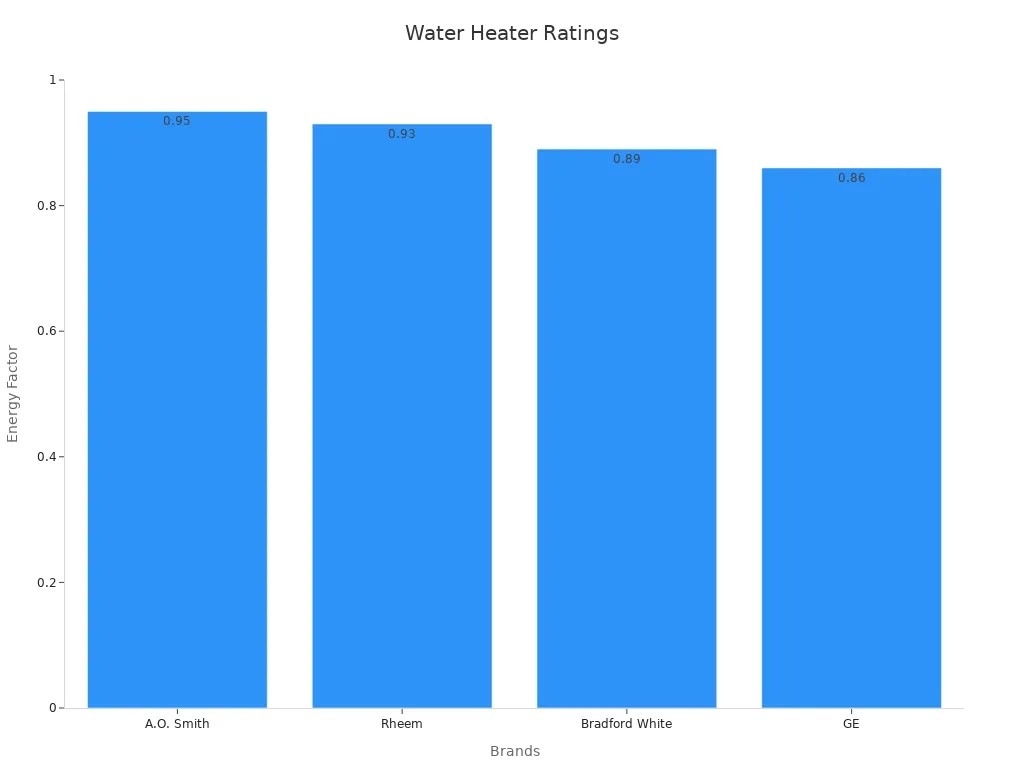
ヒント:給湯器ブランドを比較する際には、効率性だけでなく、保証、カスタマーサポート、修理サービスも考慮しましょう。これらの要素は、長期的な満足度と所有コストに影響を与える可能性があります。
給湯器用発熱体の詳細比較
給湯器発熱体の性能と加熱速度
最速の発熱体
給湯器には、特に忙しい朝や需要の多い時間帯に、素早くお湯を出してほしいものです。加熱速度は、システムのタイプと給湯器加熱エレメントの背後にある技術によって異なります。以下は、異なるシステムの比較です:
- ガスタンク給湯器はより早くお湯を沸かす 電気式よりも回収率が早く、運転コストが低いというメリットがある。
- 電気タンク式給湯器は、お湯を沸かすのに時間がかかり、通常、運転コストが高い。
- タンクレス給湯器は、オンデマンド加熱を提供します。スタンバイロスを避けられるので省エネになりますが、同時使用時の流量制限が気になるかもしれません。
- ヒートポンプ(ハイブリッド)給湯器は、従来の電気ヒーターよりも2~3倍効率的に動作します。最初の加熱には時間がかかるかもしれませんが、エネルギー消費量は大幅に削減されます。
- 瞬間湯沸かし式ディスペンサーは、数秒で沸騰に近いお湯を供給します。待機時のエネルギーロスを最小限に抑え、全体的なエネルギー消費を削減します。
最近の実験研究では、ヒートポンプ給湯器を液体分離技術の有無で比較した。液体分離型は より高い成績係数平均消費電力が低下し、エネルギー損失が減少した。この改善は、先進的なコンデンサーコイル設計がいかに加熱速度と効率を高めることができるかを実証している。
パフォーマンスの一貫性
給湯器には、蛇口をひねるたびに信頼できるお湯が出ることを期待します。安定性は、ヒーターエレメントの品質、制御システム、メンテナンススケジュールに依存します。タンクレスやハイブリッドヒートポンプモデルは、多くの場合、安定した温度を維持するために高度なセンサーとデジタル制御を使用しています。これらのシステムは、需要に基づいて出力を調整するため、温度の変動を避けることができます。従来の貯蔵タンク式ヒーターは、信頼性の高い供給が可能ですが、スタンバイ期間中に熱損失が発生する可能性があります。タンクの洗浄やスケールの付着のチェックなど、定期的なメンテナンスを行うことで、ユニットの寿命を通じて安定した性能を維持することができます。
給湯器発熱体の耐久性と寿命
素材と耐食性
給湯器の耐久性は、発熱体に使用されている素材に左右されます。銅製のエレメントは熱伝導率に優れていますが、硬水では腐食が早まることがあります。ステンレス製エレメントは腐食に強く、ミネラルを多く含む地域に適しています。ニッケルとクロムの合金から作られたインコロイエレメントは、高温と過酷な水環境に耐えます。最良の結果を得るためには、お住まいの地域の水質に合った素材を選ぶ必要があります。
従来の給湯器の一般的な寿命 6年から12年 通常の使用において。ただし、この範囲はガイドラインであり、保証ではありません。水のミネラルの含有量、メンテナンスの頻度、設置の品質、材料の選択などの要因はすべて、ヒーターエレメントの寿命に影響します。耐腐食性の材料を選び、定期的なメンテナンスを行うことで、システムの寿命を延ばすことができます。
保証とサポート
新しい給湯器に投資する際、保証があれば安心です。ほとんどのメーカーは、製品の耐久性に対する自信を反映した保証を提供しています。発熱体に対する具体的な保証条件は様々ですが、明確なサポート方針と迅速なカスタマーサービスを提供するブランドを探すべきです。信頼できるアフターサービスがあれば、問題に迅速に対処でき、ダウンタイムと修理費用を最小限に抑えることができます。購入前に必ず保証の詳細を確認し、何がいつまで保証されるのかを理解しましょう。
給湯器発熱体のエネルギー効率
消費電力
エネルギー効率は、依然として住宅所有者や企業にとって最優先事項です。様々なタイプの給湯器を比較するには エネルギー係数これは、単位消費燃料あたりの温水生成量を測定するものである。下の表は、一般的なシステムの典型的なエネルギー係数と利点をまとめたものである:
| 給湯器タイプ | エネルギー係数 | 主なメリット | 典型的な使用例 |
|---|---|---|---|
| タンクレス(結露なし) | 0.82+ | オンデマンド暖房 | 住宅、需要の高い住宅 |
| 従来の貯蔵タンク | 0.58-0.63 | 信頼できる供給 | 予算重視の設置 |
| コンデンシング・タンクレス | ~0.90+ | 熱回収 | 環境に優しい住宅 |
| ガス式トラディショナル | 0.60-0.67 | 高出力 | 大容量 |
| 電気式タンクレス | ~0.95 | コンパクトで静か | 追加、低需要エリア |
| ハイブリッド・ヒートポンプ | ~3.0 | デュアルテクノロジーによる節約 | グリーン・ビルのアップグレード |
| 太陽熱温水器 | 変動あり | 再生可能エネルギー | 日照時間の長い地域 |
| 瞬間湯沸かし器 | 該当なし | 即時配達 | 厨房・業務用 |
エネルギー消費量の測定データを見ることで、効率をさらに評価することができる。研究では 24時間固有エネルギー消費係数 電気温水器をレベル1(最高)からレベル5(最低)まで評価する。ほとんどのユーザーは通常の暖房モードを好み、省エネのために温度を60℃以下に設定している。水量、温度差、熱容量を考慮することで、自分のエネルギー使用量を計算することができる。
スマートな機能 インパクト
スマートな機能 は、給湯器の管理方法を変えました。リモコン、プログラマブル・スケジュール、適応学習機能を備えたモデルは、使用パターンを分析して加熱時間を最適化します。これらの機能は、エネルギーコストを削減し、不必要な加熱を防止し、オフピーク時間に加熱をシフトすることができます。スマート給湯器は、システムの問題に対するアラートを送信し、遠隔監視を可能にし、あなたのエネルギー消費量をより制御することができます。
実験的研究によると 待機熱損失 は、全体的なエネルギー使用に大きな役割を果たします。高効率の電気ヒーターやエネルギースタープログラム認定のモデルは、こうしたロスを最小限に抑え、お金の節約と環境への影響の軽減に役立ちます。エネルギースタープログラムは、厳しい効率ガイドラインを満たした製品を認定するものなので、新しいシステムを選ぶ際にはこの認定を探す必要があります。
ヒントスマートな機能とエネルギースター認証を備えた給湯器を選ぶことで、効率を最大限に高め、光熱費を抑えることができます。
給湯器およびヒートポンプ給湯器との互換性
適切な給湯器加熱要素を選択するには、従来の給湯器と高度なヒートポンプ給湯器の両方との互換性を考慮する必要があります。適切な適合は、システムの最適な性能、効率、および寿命を保証します。
ユニバーサル・フィット・エレメント
ユニバーサルフィットエレメントは、多くの住宅所有者に柔軟性を提供します。これらのエレメントは、さまざまな電気温水器や一部のヒートポンプ式給湯器で使用できます。メーカーは、標準的なスレッドサイズとワット数でこれらの要素を設計し、インストールが簡単になります。ブランドの制約を気にせずにエレメントをアップグレードまたは交換したい場合は、ユニバーサルフィットオプションは、実用的なソリューションを提供します。
- 簡単な調達と迅速な設置が可能です。
- ユニバーサルエレメントは、多くの場合、垂直タンクと水平タンクの両方の構成をサポートします。
- 多くのモデルは、ヒートポンプ・モードで作動するものも含め、標準的な電気システムとハイブリッド・システムの両方で作動する。
ヒントユニバーサルフィットエレメントを購入する前に、必ずご使用の給湯器の電圧とワット数を確認してください。このステップにより、互換性の問題を防ぎ、安全な動作を保証します。
ブランド固有の要素
ブランド固有のエレメントは、独自の設計と高度な機能に対応しています。Rheem、AO Smith、Bradford Whiteのような大手ブランドは、ヒートポンプ給湯器やハイブリッドモデル用にカスタマイズされた発熱体を設計することがよくあります。これらのエレメントには、独自のコネクタ、高度なアンチスケールコーティング、または統合されたセンサーが含まれる場合があります。
- 耐食性の向上や熱伝導の最適化といった機能を利用できる。
- 特にハイブリッド給湯器やヒートポンプ給湯器では、ブランド固有のエレメントがスマート制御やセルフクリーニング機能をサポートしていることが多い。
- モデルによっては、特殊な継手や電子機器の統合により、専門家による取り付けが必要なものもある。
高効率またはエネルギースター認定のシステムをお持ちの場合は、ブランド固有のエレメントを使用することで、保証範囲とシステム性能を維持することができます。常にメーカーのガイドラインを参照し、正しく適合するようにしてください。
給湯器用発熱体の価格とコストパフォーマンス
給湯器の発熱体のコストと長期的な価値を理解することは、十分な情報に基づいた意思決定に役立ちます。初期費用と継続的な節約やシステムの寿命とのバランスを取る必要があります。
初期費用
給湯器の発熱体の初期費用は、タイプ、材質、技術によって異なる。従来の電気温水器とそのエレメントは、一般的に購入費用と設置費用が低い。対照的に、ヒートポンプ給湯器とハイブリッドモデルは、高度なコンポーネントとインストールの複雑さのために高い先行投資を必要とします。
ここでは、典型的な費用と便益を比較する:
| アスペクト | 従来の給湯器 | タンクレス給湯器 |
|---|---|---|
| 初期購入費用 | $500〜$1,500 | $3,000~$4,500 |
| 設置費用 | $500〜$1,500 | $1,000~$3,000 |
| エネルギー効率 | ベースライン | 22%から34%の高効率化 |
| 年間エネルギー節約量 | 該当なし | 年間約$100 |
| メンテナンス | より頻繁な沈殿物の洗浄が必要 | スケール付着の頻度を低減 |
| 寿命 | 10年から15年 | 最長20年 |
| 財政的インセンティブ | 限定 | 費用の$300または10%までの州リベート、ENERGY STAR割引、連邦税額控除 |
伝統的なシステムの方が初期費用が安いのはお分かりだろう。しかし、タンクレスやハイブリッド・モデル、特にヒートポンプ・モード搭載のものは、初期費用が大きくなります。
長期貯蓄
長期的な節約を評価する場合、ヒートポンプ給湯器とハイブリッドモデルが際立ちます。これらのシステムは、特にヒートポンプモードでより高い効率で動作し、時間の経過とともにエネルギーコストを削減します。メンテナンスの必要性が低く、寿命が長いため、初期投資をより多くの年数に分散できるという利点があります。
- ヒートポンプモードを備えたハイブリッド給湯器は、標準的な電気モデルと比較して、エネルギー使用量を最大60%削減できる。
- 年間節約額は、地域のエネルギー料金や使用パターンにもよるが、$100以上に達することが多い。
- 多くの州がリベート、税額控除、ENERGY STAR認証割引を提供しており、投資収益率はさらに向上します。
注:先進的なシステムでは、初期費用は高くなりますが、省エネ、メンテナンスの軽減、経済的インセンティブの組み合わせにより、給湯器の耐用年数にわたって優れた価値を提供します。
消費者のレビューでは、一貫してハイブリッドおよびヒートポンプ給湯器の低い運用コストと信頼性への満足度を強調しています。あなたの投資はあなたの予算と持続可能性の目標の両方をサポートしていることを知って心の平和を得る。
給湯器の発熱体の種類とブランドに関する長所と短所のまとめ
浸漬型ヒーター発熱体
銅
銅製エレメントは熱伝導が速く、初期コストが低い。これらはタンク式給湯器、特にエントリー・レベルのモデルでよく見られる。
長所だ:
- 優れた熱伝導性で素早く加熱
- 手頃な価格で交換が容易
短所だ:
- 硬水で腐食しやすい
- 他の素材に比べて寿命が短い
ステンレス・スチール
ステンレス製エレメントは耐腐食性に優れています。特にミネラル分を多く含む水道水では、より長い耐用年数が得られます。
長所だ:
- 優れた耐食性
- 硬水環境に適している
短所だ:
- 銅より高コスト
- 熱伝導がやや遅い
インコロイ
インコロイエレメントはニッケルクロム合金を使用しています。過酷な水環境下でも最高の耐久性と性能を発揮します。
長所だ:
- 高温と腐食性の強い水質に耐える
- 浸漬型エレメントの中で最も長い寿命
短所だ:
- 高い初期投資
- 軟水地域には過剰かもしれない
給湯器用発熱体のワット密度タイプ
低ワット密度
低ワット密度のエレメントが広い面積に熱を拡散します。タンク式給湯器のスケール蓄積のリスクを低減します。
長所だ:
- 表面温度の低下によりスケールを防止
- エレメントとタンクの寿命を延ばす
短所だ:
- 大きいサイズはすべてのモデルに合うとは限りません
- 加熱がやや遅い
高ワット密度
ワット密度の高いエレメントが素早くお湯を沸かします。高速回収が重要な従来の電気湯沸かし器に見られる。
長所だ:
- 迅速な加熱性能
- ほとんどのタンクにフィットするコンパクトサイズ
短所だ:
- スケール蓄積のリスクが高い
- 硬水では寿命が短くなる
スマートで先進的な給湯器用発熱体
Wi-Fi対応
Wi-Fi対応エレメントで給湯器を遠隔操作。携帯電話から設定を調整したり、使用状況をモニターしたりできます。
長所だ:
- リモートコントロールとモニタリング
- スケジューリングによる省エネ
短所だ:
- Wi-Fi接続が必要
- 専門家による設置が必要な場合がある
セルフクリーニング
セルフクリーニングエレメントは、スケールを減少させる技術を使用しています。メンテナンスにかかる時間が短縮され、安定した性能をお楽しみいただけます。
長所だ:
- 手作業による清掃を最小限に
- 長期間にわたって効率を維持
短所だ:
- 初期費用が高い
- 一部のモデルには在庫に限りがあります。
ヒントヒーターエレメントのタイプは、常に水質と使用ニーズに合わせてください。こうすることで、最高の性能と価値を得ることができます。
トップ給湯器ブランドのブランド比較
リーム
Rheemは多くの業界リストのトップにランクインしている。このブランドは、電気およびハイブリッド給湯器の広い範囲を提供しています。リームのヒーターは、耐腐食性に優れた高度な素材を使用しています。あなたは、多くのモデルでは、デジタル制御とWi-Fi接続の恩恵を受ける。同社は強力な保証サポートと高い給湯器の評価を提供しています。リームは、革新性と信頼性のバランスのために際立っている。
AOスミス
AOスミスはハイブリッドヒートポンプ技術でリードしています。軟水でも硬水でも効率的に働くヒーターエレメントを手に入れることができます。AOスミスは、スケール防止機能と省エネに重点を置いています。このブランドは幅広い容量をカバーしており、多くの家庭に適しています。AOスミスは、性能と耐久性で常に高い評価を受けています。
カムコ
カムコは交換用発熱体の専門メーカーです。素材は銅、ステンレス、インコロイからお選びいただけます。カムコのエレメントは、ほとんどの標準的な電気温水器に適合する。このブランドは、手頃な価格と簡単な設置を強調している。カムコは高度なスマート機能を提供していないが、基本的なニーズには信頼できる性能を得ることができる。
エコ・スマート
EcoSmartは、自己調節技術を搭載したタンクレス給湯器をお届けします。コンパクトな設計と最小限の待機熱損失がメリットです。EcoSmartの発熱体は、需要に応じてエネルギー使用量を調整します。このブランドは、エネルギー効率と長寿命を重視しています。EcoSmartは、持続可能性を重視するモダンな住宅に適しています。
ブラッドフォード・ホワイト
ブラッドフォード・ホワイトの目標は信頼性とサービスです。迅速な修理とプロフェッショナルなサポートを提供するために設計されたヒーターエレメントを手に入れることができる。このブランドは堅牢な構造を採用し、高い回収率を誇るモデルを提供しています。ブラッドフォード・ホワイトは、強力なアフターサービスと一貫した給湯器の評価で高い評価を維持しています。
イーマックス
Eemaxは家庭用と業務用の電気タンクレス給湯器を製造しています。高度な温度制御とコンパクトなユニットが特長です。Eemaxの発熱体は、簡単な設置と安定した給湯をサポートします。このブランドは、効率的で省スペースなソリューションを求めるユーザーにアピールしています。
アメリカン・スタンダード
アメリカンスタンダードは耐久性と効率性を重視しています。様々な給湯器モデルに適合する耐腐食性発熱体を見つけることができます。このブランドは、簡単なメンテナンスと信頼性の高い性能を提供しています。アメリカンスタンダードは、定評のあるブランドの中でも信頼できる名であり続けています。
アリストン
アリストンは、ヨーロッパのエンジニアリングと省エネ機能を兼ね備えています。小さなスペースにもフィットするコンパクトな給湯器が得られます。このブランドは、ユーザーフレンドリーなコントロールと効率的な加熱を重視しています。アリストンは、アパートや小規模な住宅に適しています。
ヒーテックス
ヒーテックス社は、住宅用と産業用の両方のヒーターエレメントを提供しています。さまざまなワット数と素材からお選びいただけます。このブランドは、高い熱効率と堅牢な構造を提供します。Heatexは、ユニークなアプリケーションのためのカスタムソリューションを必要とするユーザーに適しています。
ミラノ
Milanoは、さまざまなシステムに信頼性の高いヒーターエレメントを提供します。耐腐食性が向上し、取り付けが簡単です。このブランドは、多くの交換やアップグレードプロジェクトをサポートしています。Milanoは、その実用的なアプローチと様々な給湯器の定格との互換性で際立っています。
ヒント:ブランドを比較するときは、常に特定の給湯器モデルとの評価と互換性を確認してください。このステップにより、最高の性能と価値を得ることができます。
さまざまなニーズに最適な給湯器用発熱体
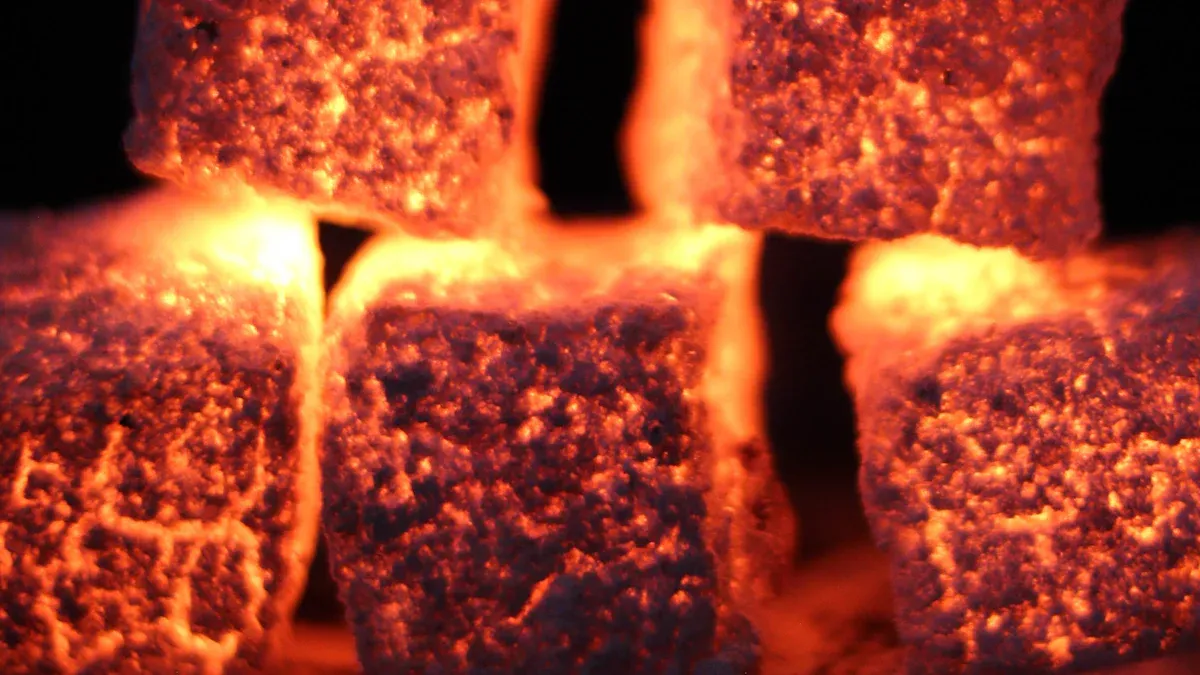
最高の総合給湯器ヒーター・エレメント
総合的に最適なヒーターエレメントを選択するには、幅広い用途における性能、効率、適応性を考慮する必要があります。市場セグメンテーションデータは、タンクレス、蓄熱式、ハイブリッドシステムのいずれを使用する場合でも、ヒーティングエレメントを特定のニーズに適合させることの重要性を強調しています。エネルギー効率と持続可能性により、現在51%以上の売上シェアで市場を支配している電気ヒーターが最も有益である。タンクレス給湯器は、迅速なお湯の供給と待機ロスの削減が支持され、引き続き人気が高まっている。貯湯式給湯器は、エネルギー変換と低メンテナンスが評価され、依然として大きなシェアを占めている。
総合的に最適なヒーターエレメントを見極めるには、以下のような要素に注目する必要がある:
- タンクレス、ストレージ、ハイブリッド・システムとの互換性
- 高いエネルギー効率と急速加熱能力
- 住宅と商業施設の両方で実証済みの耐久性
- 複数の地域と設置タイプで利用可能
| セグメンテーション・カテゴリー | 詳細 |
|---|---|
| タイプ | タンクレス、貯蔵タンク、ハイブリッド |
| テクノロジー | 電気、ソーラー、ガス |
| 製品タイプ | インスタント、ストレージ |
| 定員 | 30L未満、31~100L、101~250L、251~400L、401L以上 |
| 申し込み | 住宅、商業 |
| 地域 | 北米、欧州、アジア太平洋、中南米、中東・アフリカ |
高度なスケール防止コーティングとスマート制御を備えた電気ヒーターは、効率と信頼性において常に他社を凌駕していることがお分かりいただけるでしょう。これらのエレメントは、屋内と屋外の両方の設置によく適応し、幅広い容量に対応します。主要ブランドは、スプリットシステムや統合システムに適合するエレメントを提供することで、どのような用途にも対応できるソリューションを提供します。
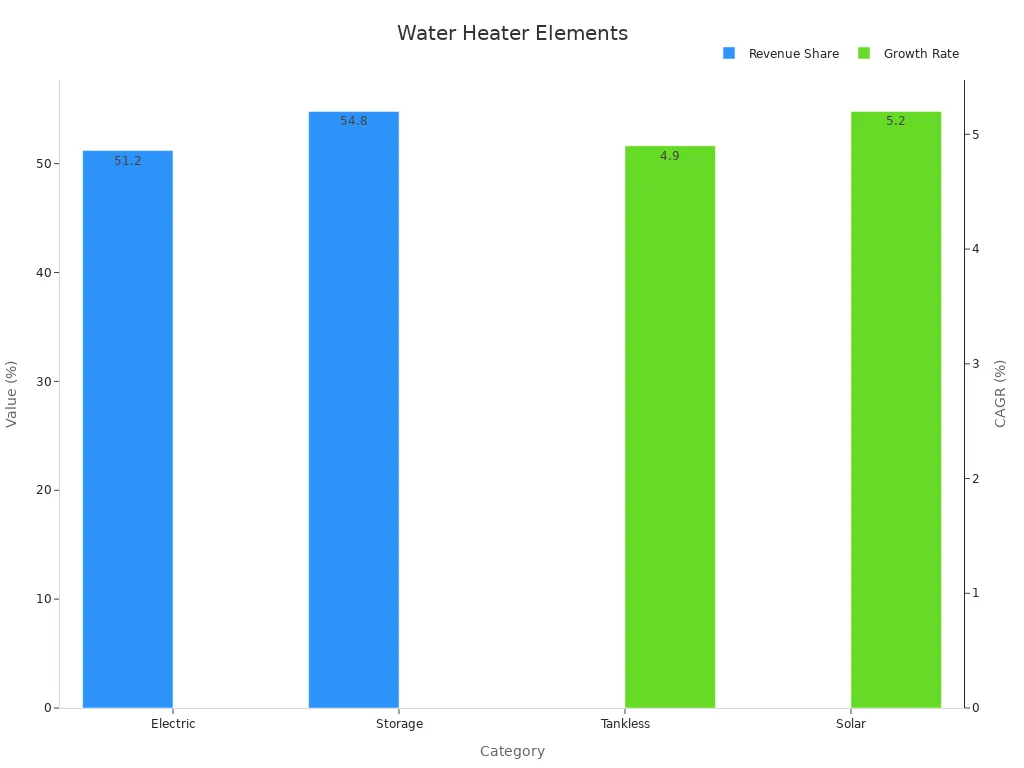
ヒント総合的な性能を最大限に引き出すために、エネルギー係数が高く、お使いのシステムタイプに適合する電気ヒーターをお選びください。
硬水に最適な給湯器用発熱体
硬水の地域にお住まいの場合、独特の問題に直面します。硬水はカルシウムとマグネシウムを多く含み、発熱体にスケールを蓄積させます。この蓄積は、特にタンク給湯器の底部エレメントの早期故障につながる可能性があります。 アメリカの家庭の85%以上 硬水であることが広く懸念されている。
スケールに強く、安定した加熱を維持できる発熱体が必要です。ステンレス鋼とインコロイエレメントは、耐腐食性と耐スケール性に優れています。これらの素材は、頻繁な交換を避け、効率を維持するのに役立ちます。 実験的研究 は、信頼性の高いヒーターエレメントと適切なメンテナンスが、スケールに起因する故障やレジオネラ菌の繁殖などの微生物による危険のリスクを低減することを示しています。適切な温度プロファイルを維持し、適切な断熱材を使用することで、システムはさらに保護されます。
硬水条件下で給湯器の性能を最適化するには、以下の手順を考慮してください:
- ステンレス製またはインコロイ製の発熱体の取り付け
- 軟水化システムやスケール防止フィルターを使用する
- 水のpH、ミネラル、総溶解固形分(TDS)の検査
- 定期的な清掃と点検スケジュールの維持
注:耐腐食性のヒーターエレメントと水処理システムを組み合わせることで、硬水環境での長期的な効率と安全性が保証されます。
ベスト・バジェット・ウオーター・ヒーター・ヒーティング・エレメント
ヒートポンプ給湯器の価値を最大限に高めたい場合、初期費用と長期的な節約のバランスを取る必要があります。予算分析によると、エネルギー係数(EF)評価の高いヒートポンプ給湯器は、最高のパフォーマンス対コスト比を提供することを示しています。これらのモデルは、より高い初期投資が必要ですが、あなたは時間の経過とともに大幅なエネルギー節約の恩恵を受ける。
| EF定格範囲 | 貯蓄水準 | 説明 |
|---|---|---|
| 1.5以下 | 低貯蓄 | エネルギー消費量が多く、初期コストは低いが、長期的なエネルギー代は高い |
| 1.5から2.0 | ミディアム・セービング | エネルギー使用量とコストのバランス |
| 2.0以上 | 高い貯蓄性 | 高いエネルギー効率、初期コストは高いが長期的には大幅な節約になる |
| モデル名 | EFレーティング | 推定年間エネルギー・コスト |
|---|---|---|
| モデルA | 3.5 | $120 |
| モデルB | 2.8 | $160 |
| モデルC | 4.0 | $110 |
RheemのProTerra Hybrid (3.75 EF)やClassic Series (3.40 EF)のようなモデルは、効率と手頃な価格の最高の組み合わせを提供することがわかります。これらの暖房器具は、年間エネルギーコストの節約に役立ち、多くの場合、数年以内に高い購入価格を相殺します。
ヒント EF値が2.0以上 最高のコストパフォーマンスと長期的な節約を実現する。
スマートホームに最適なスマート給湯器の発熱体
スマートホームを効率的に稼働させたいなら、給湯器もコネクテッド・エコシステムにシームレスに適合させるべきです。現在、最高のスマート給湯器発熱体は、高度な接続性、エネルギー管理、予測メンテナンスを提供しています。Wi-Fi、Zigbee、またはBluetoothの統合により、どこからでもシステムを監視・調整することができます。
最近の技術導入に関する研究 を見ると、Wi-Fiは依然として遠隔操作とモニタリングのための最も人気のある接続オプションであることがわかる。Zigbeeは、そのメッシュ・ネットワーキングと低消費電力で人気を集めており、スマートホームの統合に理想的だ。Bluetoothは、シンプルなローカル・コントロールを提供しますが、接続範囲が制限されます。これらの技術は、サーモスタット、漏水検知器、音声アシスタントなど、他のスマート・デバイスとの相互運用性を可能にするためです。
| アスペクト | 証拠概要 |
|---|---|
| コネクティビティ・テクノロジーズ | Wi-Fiは遠隔操作と監視のために最も普及している。Bluetoothは簡単なローカル制御を提供するが、範囲は限られている。Zigbeeはメッシュネットワーキングと低消費電力のために人気を集めており、スマートホームの統合に理想的である。 |
| 市場成長ドライバー | エネルギー効率に対する消費者の意識の高まり、持続可能な電化製品の普及を促進する政府規制、予知保全と個別化されたエネルギー管理のためのAI/MLの進歩。 |
| 製品タイプ別セグメント | エネルギー効率と省スペースのためにタンクレスモデルが好まれ、エネルギー管理のためのスマート機能で強化されたストレージモデル、利点を組み合わせ、効率化のためにヒートポンプ技術を使用するハイブリッドモデル。 |
| 地域別の採用傾向 | 北米はスマートホームの早期導入と政府の優遇措置でリード、欧州は厳しいエネルギー規制で成長、アジア太平洋は都市化と所得の増加で最も高い成長を見せている。 |
| スマートホームの統合 | IoTとスマートホームのエコシステムは、シームレスな相互運用性とエネルギーの最適化を可能にする高度な接続性(Wi-Fi、Zigbee)を備えた機器の需要を促進する。 |
| 課題 | 初期コストが高く設置が複雑なため、地域によっては導入が制限されることもあるが、長期的なエネルギー節約と改修の機会が成長を支えている。 |
スマート・ヒーターの利点は、いくつかの点である:
- リモート・スケジューリング:給湯器をオフピーク時に作動するように設定し、エネルギーコストを削減する。
- 予知保全:問題が発生する前にアラートを受信し、ダウンタイムを最小限に抑えます。
- エネルギーの最適化:家庭用エネルギー管理システムと統合し、個別の効率化を実現。
ヒントWi-FiまたはZigbeeを搭載したスマートヒーターを選ぶと、主要なスマートホームプラットフォームとの互換性が最も高くなります。これにより、ルーチンを自動化したり、電話や音声アシスタントから使用状況をモニターしたりすることができます。
スマートな機能を備えたハイブリッドモデルは、エネルギー源やモードを柔軟に切り替えることができ、効率を最大限に高めます。また、特に北米やヨーロッパでは、持続可能な電化製品を奨励する規制があるため、政府による優遇措置やリベートも受けられます。初期投資は高く見えるかもしれませんが、長期的な省エネとメンテナンスの軽減でコストを回収できます。
ヒートポンプ式給湯器に最適な給湯器用発熱体
高度な技術に見合った発熱体が必要 ヒートポンプ給湯器の。これらのシステムは、信頼性のために電気バックアップ素子とヒートポンプ効率を組み合わせたハイブリッドアプローチを使用しています。右の加熱要素は、特に寒冷地や需要の高い期間中に、最適なパフォーマンスを保証します。
メーカーは、高効率、高速リカバリ、およびスマートコントロールとの互換性を提供するためにヒートポンプ給湯器の発熱体を設計しています。A.O.スミス、Rheem、Ruudのような一流ブランドは、優れたエネルギー係数と寒冷地効率を備えたモデルを提供しています。これらのエレメントは多くの場合、4,500ワットの銅製構造、漏水防止技術、スマートな接続性を特徴としています。
| ブランド | モデル | 容量(ガロン) | 最大世帯人数 | 涼しい気候の効率(CCE) | ユニフォーム・エネルギー・ファクター(UEF) | 主な機能と互換性のハイライト |
|---|---|---|---|---|---|---|
| A.O.スミス | ヴォルテックス 50ガロン | 50 | 2-3 | 3.4 | 3.8 | 4,500ワットの銅製バックアップヒーターエレメント2個、自動シャットオフバルブ対応のアンチリークテクノロジー、iCOMM™スマート接続、柔軟な設置(上部/前面接続、側面/背面クリアランスなし) |
| A.O.スミス | ヴォルテックス 66ガロン | 66 | 3 | 3.5 | 4.02 | ヒートポンプと電気抵抗を切り替えるハイブリッド・システム、4,500ワットの電気エレメント、エネルギー・スター認定、NEEA Tier 4認定 |
| A.O.スミス | ヴォルテックス 80ガロン | 80 | 4+ | 3.4 | 3.88 | 4,500ワットの銅製発熱体2個; Tank Guard™腐食保護; 複数の運転モード(効率、ハイブリッド、電気、休暇); Energy Star認証; NEEA Tier 4適合 |
| リーム | プロテラ 80ガロン | 80 | 4 | 3.2 | 4.0 | 高UEF、バックアップ電気暖房、WiFiおよびアレクサ対応、エネルギースター認定、NEEA Tier 4認定 |
| ルード | HPLD80-1RU | 80 | 4 | 3.2 | 4.0 | Rheemと同様の高効率とバックアップヒーターエレメント |
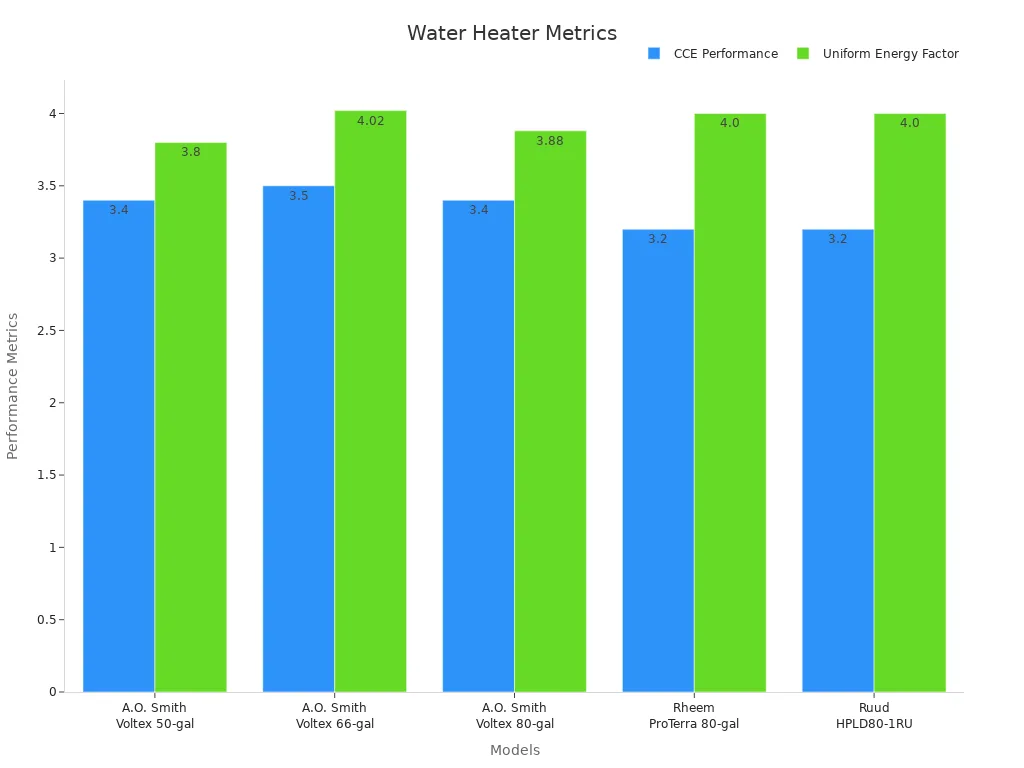
これらの機能にはいくつかの利点がある:
- 高い均一エネルギー係数(UEF):最大4.02を達成し、省エネを最大化。
- 寒冷地効率(CCE):低温下でも性能を維持。
- スマートな互換性:Wi-FiまたはiCOMM™接続を使用して、遠隔監視と制御を行います。
- 柔軟な設置:上面または前面接続で、さまざまな場所にシステムを設置できます。
A.O.スミス・ヴォルテックスやリーム・プロテラのようなハイブリッド型は、ヒートポンプと電気抵抗のモードを切り替える能力が際立っています。ヒートポンプ技術の効率を享受しながら、ピーク需要時や寒冷時に信頼性の高いお湯を得ることができます。これらの暖房器具は、エネルギースター認証と高度な漏水防止機能にも対応しており、安心と長期的な節約を実現します。
注:ヒートポンプ給湯器専用に設計された発熱体を必ず選択してください。これにより、最高の効率、安全性、およびハイブリッドシステムとの互換性を実現できます。
これで、Rheem、AO Smith、Camco、EcoSmartなど、2025年向けの主要な給湯器用発熱体とブランドをご理解いただけたと思います。ヒーターエレメントを選ぶ際には、以下の点に注目してください:
- 性能と加熱速度
- 耐久性と耐食性
- エネルギー効率とスマート機能
- お使いの給湯器モデルとの互換性
- 投資の価値
お客様の水質、システムタイプ、ご家庭のニーズに最も適したエレメントをお選びください。正しい決断が、信頼できるお湯と長期的な節約をお約束します。
よくあるご質問
低ワット密度発熱体と高ワット密度発熱体の違いは何ですか?
低ワット密度のエレメントは、より広い面積に熱を拡散するため、スケールの蓄積を抑え、寿命を延ばします。ワット密度が高いエレメントは、水を早く加熱しますが、特に硬水の場合、スケールが早く蓄積する可能性があります。
給湯器の発熱体はどのくらいの頻度で交換すべきですか?
ヒーターエレメントは2~3年ごとに点検してください。加熱性能の低下や目に見える腐食に気づいたり、マルチメーターによる導通検査でエレメントが不合格になった場合は、交換してください。
給湯器にはどんな発熱体でも使えますか?
電圧、ワット数、ネジサイズを給湯器のモデルに合わせる必要があります。システムによっては、適切な取り付けと機能のために、ブランド固有のエレメントが必要な場合があります。購入前に必ずメーカーの仕様書を参照してください。
スマート給湯器の発熱体は投資に値するか?
スマートヒーターは、遠隔操作、エネルギー監視、スケジューリングが可能です。利便性と省エネの可能性が得られます。これらの機能は、効率と自動化を重視する現代の住宅に適しています。
硬水に最適な素材は?
ステンレスとインコロイの発熱体は、腐食やスケールの蓄積に強い。硬水のご家庭では、これらの素材を選ぶべきです。銅製のエレメントに比べて長持ちし、メンテナンスも少なくて済みます。
セルフクリーニング・ヒーターはどのように機能するのですか?
セルフクリーニングエレメントは、高度なセンサーと制御戦略により、スケールの蓄積を抑えます。この技術により、最小限の手動洗浄で効率を維持し、給湯器の寿命を延ばします。
ハイブリッド式ヒートポンプ給湯器には特別な発熱体が必要ですか?
ハイブリッドヒートポンプ給湯器は、多くの場合、特定のバックアップ加熱要素を使用しています。これらの要素は、システムの電圧とワット数の要件に一致する必要があります。互換性については、常にメーカーの推奨事項を確認してください。
新しいヒーター・エレメントを自分で取り付けられますか?
基本的な配管と電気の技術があれば、ヒーターエレメントの交換は可能です。必ず電源と給水を切ってから行ってください。不安な場合は、安全な交換のために免許を持った専門家にご相談ください。


